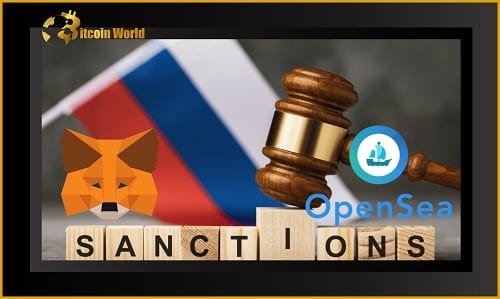Is crypto truly decentralized when real-world politics comes knocking? Recent events have thrown the spotlight on this very question. As sanctions tighten around Russia and ripple effects touch nations like Iran, the crypto world is facing a stress test of its foundational principles. Let’s dive into how crypto exchanges, NFT marketplaces, and wallet providers are reacting, and what it means for the future of digital assets.
OpenSea and MetaMask: Early Signs of Centralized Control?
The first tremors were felt when OpenSea, the leading NFT marketplace, reportedly began restricting access for Iranian users. Why? Citing US sanctions and its reliance on Infura, a service hosted in the US. Shortly after, MetaMask, a widely used Ethereum wallet, became unavailable in certain countries also blacklisted by the US. This sparked a crucial debate:
- Decentralization Dilemma: Crypto is often touted as being beyond the reach of governments and traditional financial systems. But these actions raise concerns about the extent to which crypto platforms are still vulnerable to centralized infrastructure and regulations.
- Infura’s Influence: Both OpenSea and MetaMask depend on Infura to interact with the blockchain. This dependency highlights how even ‘decentralized’ applications can rely on centralized services, making them susceptible to external pressures.
- Sanctions Compliance: OpenSea, based in New York, stated they were compelled to comply with US sanctions. This underscores the legal obligations that crypto businesses operating within specific jurisdictions must adhere to.
Venezuela also experienced restricted access to MetaMask, initially appearing as an unintended consequence of Infura’s wider crackdown. Infura later clarified that it was indeed blocking access in multiple US-sanctioned countries, including regions in Ukraine.
At the time, it remained unclear if Russia itself would face similar restrictions from these services. As Western sanctions against Russia intensified in early March, the crypto community braced for impact.
Russian Crypto Sanctions: Will Exchanges Draw a Line?
The question on everyone’s mind: would major crypto exchanges follow suit and block Russian users? The answer, it turns out, is nuanced.
Binance, the world’s largest crypto exchange, announced it would comply with sanctions by restricting access for specific sanctioned Russian entities and individuals. However, they emphasized that they would not implement a blanket ban on all Russian users.
Kraken, another prominent exchange, took a stronger stance. CEO Jesse Powell publicly stated that Kraken would not freeze accounts of all Russian citizens without a legal requirement to do so. He argued that such broad measures would contradict crypto’s libertarian values.
This divergence in approach highlights the complex balancing act crypto exchanges face:
| Exchange | Sanction Approach | Key Takeaway |
|---|---|---|
| Binance | Complying with sanctions against specific entities but not all Russian users. | Seeking to balance regulatory compliance with user access. |
| Kraken | Will not preemptively ban all Russian users, citing libertarian principles. | Prioritizing user access and decentralization values, unless legally compelled. |
These decisions came in the wake of calls from the Ukrainian government to blacklist all Russian crypto users and even offers of rewards for information on Russian and Belarusian bank accounts.
The crypto community largely criticized these calls, arguing that politics and regulation should not infringe upon the space. However, the reality is that many crypto platforms operate with centralized infrastructure, making them subject to regulatory pressures.
Could Russia Use Crypto to Evade Sanctions?
Amidst the sanctions, speculation arose about Russia potentially using cryptocurrencies to bypass financial restrictions. While some experts downplayed this possibility due to the scale of Russia’s economy and the transparency of blockchains, the concern remains.
In response, both the US and the European Union have taken steps to include cryptocurrency in their sanctions regimes. They are actively monitoring and warning exchanges against facilitating transactions with sanctioned Russian entities. The EU has stated it will take measures to prevent Russia from using crypto to circumvent sanctions.
The Decentralization Debate: A Continued Conversation
The events surrounding sanctions and crypto’s response have reignited the fundamental debate about decentralization. While crypto offers the promise of borderless and censorship-resistant finance, the reliance on centralized services and the need for regulatory compliance create inherent tensions.
This situation serves as a critical reminder that the crypto landscape is still evolving. The balance between decentralization ideals and real-world regulations will continue to be a defining factor in shaping the future of cryptocurrencies.
Key Takeaways:
- Sanctions are testing the decentralized nature of cryptocurrency.
- Major exchanges are taking different approaches to compliance, highlighting the ongoing debate within the crypto community.
- Regulatory scrutiny of crypto is increasing as governments seek to prevent sanctions evasion.
- The future of crypto will depend on navigating the complexities of decentralization, regulation, and real-world political pressures.
Related Posts – Ferrari joins the NFT universe through a collaboration with a Swiss…
Disclaimer: The information provided is not trading advice, Bitcoinworld.co.in holds no liability for any investments made based on the information provided on this page. We strongly recommend independent research and/or consultation with a qualified professional before making any investment decisions.




